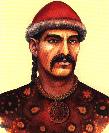
For six decades after Tervel's rule, Bulgaria was racked by internal fighting among the nobles. The pride over Tervel's glorious victories over the Byzantines and the Arabs was fading. Bulgaria was growing weak, shaken by continuous battles for the throne. Khans came and went, falling victim to their rivals or seeking refuge in Constantinople. Khan Kardam took the helm in the midst of this chaos and from 777 to 803, he fought to defend his throne, either striving to preserve the internal peace or waging wars with Byzantium. The wars had started in Khan Asparukh's time and would continue almost throughout the medieval period in Bulgaria.
When Kardam put an end to internecine fights, the young state once again rallied around its ruler.
A weaker Byzantium as well as internal peace in Bulgaria gave the Khan a chance to strengthen his power. He sought to continue the state's expansion, started under Asparukh, to the south and southwest. Those lands were inhabited by Slavic tribes, potential allies against Byzantium. They could buffer the assaults of the Byzantines who were eager to crush the barbarian state.
In 789 Khan Kardam defeated the Byzantine army in the valley of the Struma river. The local Slavic tribe of Strimonians welcomed the Khan and his warriors. Enraged, Emperor Constantine VI himself led his army in a march on Bulgaria. A fierce battle ensued in July 796, near the fortress of Markella in Eastern Thrace, and the Byzantines suffered a crushing defeat. The elite of Byzantine commanders were killed. The Bulgarians captured part of the Byzantine army, the treasure hoard, horses, and the royal tent and servants, reads the gloomy account of the Byzantine chronicler Theophanes.
This victory restored Bulgaria's honor. Emperor Constantine VI returned to Constantinople humiliated. He signed a peace treaty with Khan Kardam under which he was to pay him annual tribute. Later the basileus attempted to ignore his treaty obligations and the Bulgarian ruler sent him a warning: "Pay your dues or I'll ravage Thrace".
Khan Kardam spent the last years of his life in venerability and peace, happy that he had consolidated the state and the power of the Khan. He was the first Bulgarian ruler in the second half of the VIII century who provided for Bulgaria a decade of peaceful development.

 My name is Radostina Georgieva, "Roddy".
My name is Radostina Georgieva, "Roddy".